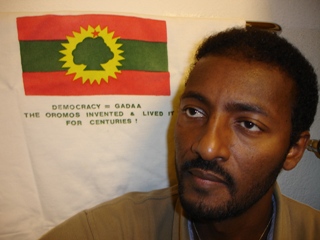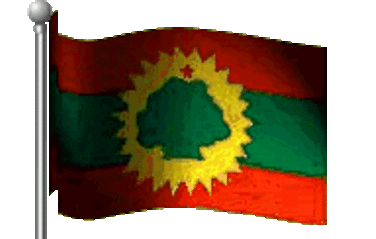Oromiya voices against conquest, collaboration, neutrality, and silence
By Leenjiso Horo
Never doubt that a small group of thoughtful determined citizens can change the world; it is the only thing that ever has. Margaret Mead
1. General Introductory Remarks
This paper is written for those Oromo nationals, for those nationals who do not know about the Oromo struggle, its purpose, and its problems, for those nationals who do not want to know about it: the indifferent spectators; for those nationals who know little about it, and for those nationals who know everything about it, but choose to seek personal self-interest at the compromise of Oromo national struggle. And it is also written for the Oromo generation yet unborn, the generation that may ask questions to known and understand about us, the generations before it. Again as a reminder, it is also for those nationals who have been carrying the burden
of Oromo national liberation struggle. All in all, this paper is about the conquest of Oromiya, the Oromo struggle, the problems, and the change sought.
Every struggle is for a change, a change for social, political or otherwise. A struggle against colonial occupation is a struggle for a political change, a change from status of colonial subject to status of free and independent people. This paper highlights the essence of the Oromo struggle for independence along with the crime of conquest and occupation of Oromiya. As well as the dangers of collaboration, neutrality, and silence and the betrayal and propaganda of the revisionist Oromo nationals. It also draws some lessons from the collaborators shown up in other societies and compares that experience with the past and the present political situations in Oromiya. In the process, the paper fosters the spirit of Oromoness: truth, unity and exposes lies and deceptions in the struggle. All in all, this article is written with George Santayana's immortal warning in mind: Those who cannot remember the past are condemned to relieve it.
History is full of changes. Changes in many directions: social, political, science, medicine, art, music and et cetera. Change is the law of nature; so everything changes; nothing stays constant for all times. That is why the change from colonialism to independence is inevitable. And every change, political or otherwise, begins in Margaret Mead's words with “a small group of thoughtful, determined citizens." It is such a group that “can change the world" and "it is the only thing that ever has", she observed. Indeed, it is such a highly motivated, thoughtful,
conscious, and visionary group that can truly galvanize the whole population to bring about the sought change. The logic of this implies that the engine of change is the people, the organized people. That is the conscious and organized force. To this effect, the first basic Marxist-Leninist doctrine states that "uniting the broad masses is a decisive guarantee for the victory of the
revolution."
The interest of this paper is with a political change, a political struggle for a change. This is what the Oromo struggle is all about. In the recorded history, no political change had ever been made easily, smoothly, painlessly, peacefully, and without inconvenience. So, political change had never happened easily in the past; it will never happen now, and will not happen in the future. The reason is plain and simple to understand. Here is why. As Newton's Law of Force reminds us, "for every action there is equal and opposite reaction." That is, for every force, there
is opposite force acting against it. It goes without saying then for every revolution, there is counterrevolution. And for every national liberation struggle, there is counter national liberation struggle. Hence capitulationists, opportunists, and revisionists are opponents of national liberation struggle; they resist, counter, and hinder national liberation struggle. And hence they are opponent of liberation. Since colonial occupation, the Oromo struggle has been facing such
opponents. The origin of the opponents are and have been both from within and from
without. While the colonial regime and its foreign sponsors are the external opponents of the Oromo national struggle, its local Oromo alliances are the internal one.
2. The conquest and occupation
Empires by their very nature and characteristics were and still are both in opposition to, in contradiction and in conflict with freedom, independence, and sovereignty of nations. Empires were formed through bloody and brutal conquest of sovereign and independent nations and nationalities. Ethiopia, for example, is such an empire. This empire, the Ethiopian empire, was formed through bloody conquest of nations and nationalities in the Horn of Africa, Oromiya included. In the conquest of Oromiya, Emperor Menelik II of Abyssinia created hell on earth for Oromo. He massacred Oromo men, women, and children. In that war of conquest, many Oromo had been shot and many had been literally butchered with knives and axes and their
bodies were disfigured. Their fingers, arms, legs, and heads were separated lying around everywhere in a heap. Pregnant women with their unborn were slaughtered. The living women's breasts were hacked off with knives. And the living men's eyes were gouged out; their limbs were emasculated and mutilated. Today, the piles of mutilated and disfigured skeletons of his Oromo victims stand as a living witness at Aannolee and Calanqo. Moreover, villages across Oromiya were razed to the ground. It was in this way, the Abyssinian ruler, Emperor Menelik II, formed Ethiopia. And so, Ethiopia is an empire. Hence the Ethiopian empire, as all empires before it, was created by force and ever since has been controlled and administered by brute use
of force. With this, the successive empire rulers undermined the political, social, legal, and moral structures of the societies that were conquered and fall under them.
Moreover, with occupation the Oromo people were deprived of their national sovereignty. And ever since they have been denied of their right to self determination as a distinct people; Oromiya and its people were torn apart. The Oromo people lost their rights to their country and land. The entire Oromiya was divided into administrative regions as into Provinces (Teqilay Gizats), Provinces into counties (Awuraajas), and Counties into districts (woredas) of empire of
Ethiopia. Abyssinian legal system was imposed on the conquered nations. In Oromiya, system of "ballabbat" or landowning class was created and erected to destroy the Gada system, its institutions, its laws, and the leadership of the Oromo people. As a result, the Oromo have become a nation without state, without institutions, and has been without leadership ever since. In their place, the colonial administration created local chieftains (balabbats or qoroo) as a leadership for every tribe on the basis of tribal setting for the purpose of tax collection and to discourage resisting the occupation. They were created to enforce laws and order of the empire
in their areas. Indeed, they were integral part of security apparatus of the empire. Hence since occupation, Oromiya has been under the successive administration of colonial bureaucrats along with their native Oromo collaborators. This has left Oromo generations with no point of institutional memory and reference to fight for. For the Oromo generation of today, our history has became events of the past, distant past and blurred. Particularly for Abyssinianized Oromo nationals, it has no attraction. But our history is not a muted history, but living history. The problems the Oromo political organizations have been facing today arouse from this. As consequence, most nationals could not pass immediate local appeal and so unable to politically connect themselves to the nation, the history, the country and its struggle. Individuals with Abyssinians political outlook, political attitude and appeal have been at the organizational hierarchy of Oromo political organizations. As a result, there has been and is a continued struggle within leadership and within members of the organizations between the nationalists and the bureaucratized and politically Abyssinianized Oromo Abyssinian lackeys. The consequence of this is the fragmentation of nationals and stagnation of national struggle.
Needless to say, when Abyssinia colonized Oromiya, it made every attempt, until recent years, to Abyssinianize its conquest. Hence the conquest of Oromiya meant that the Oromo language no longer the primary language for Oromo people. Even though, the Oromos could not be prevented from speaking it, but as a subject of Abyssinia, it was Amharic that was to be Oromo's primary tongue. In Oromiya, the Abyssinian language was made the language of the courtroom, schools, bureaucracy, media and etc. If you do not speak Amharic, you cannot be hired at any level in the empire. Oromo language was presented as unintelligible language, as "birds" language. The objective was to discourage the Oromo children from speaking it. The
Abyssinian cultures, meaning the Amhara and Tigrean cultures were imposed upon the colonized nations and nationalities. That is, the colonized people had to sing Abyssinian song. They had to listen to Abyssinian music, dance the Abyssinians way of dancing, and greet each other in Abyssinian language, either in Amharic or Tigrean language. All in all, the conquest was Abyssinianized.
Furthermore, the successive Abyssinian rulers tried to obliterate the Oromo past and their history. They distorted the Oromo history. In that, Oromo were presented as a people without history. The Oromo children, instead of studying, learning, and knowing their own Oromo history had been told and forced to study, to learn and to know the Amhara and Tigrean history, their heroes and heroines. Again instead of having pride, in being Oromo, the Oromo youths had been told and forced to take pride in being Ethiopian. These are the tragedies that are still haunting the Oromo national’s to-date. Today, the recalcitrant intellectuals, the profiteers, and
those who pursue narrow individual interests are the hangers-on on Abyssinian culture, on its identity and attitude. It is these recalcitrant groups that are bombarding the Oromo youths with the political propaganda of democratization of Ethiopian empire. It is only with the restoration of Oromo independence, this tragedy of occupation, the Ethiopian colonialism, one of the cruelest crimes of the last quarter of the nineteenth-century, will have to be rectified. It can only
be rectified with the independence of Oromiya.
----------------------To be continued--------------------------------


